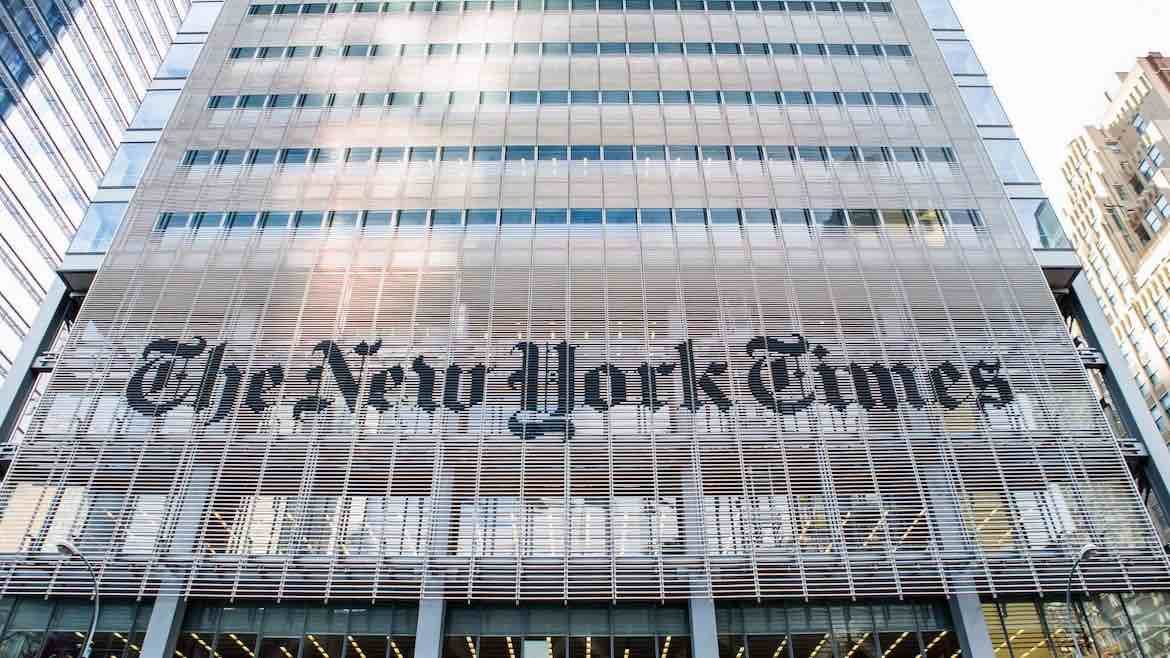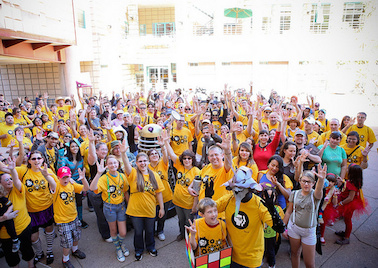Public radio stations call on New York Times to take responsibility for ‘lapses in judgment’

Anthony Quintano / Flickr
The New York Times’ handling of revelations about its award-winning podcast Caliphate has leaders in public radio questioning decisions made by the news organization and actions taken by Michael Barbaro, host of the Times’ podcast and radio show The Daily.
In a letter to the New York Times Monday, the Public Radio Program Directors Association and leaders at more than 20 public radio stations did not call for specific changes at The Daily, which airs on 288 stations. But they asked the Times to take responsibility for “lapses in judgment” and to take steps “to remedy them now and in the future.”
The unraveling of Caliphate’s credibility began after a key source for the 2018 podcast about the Islamic State terrorist group was charged by Canadian authorities last year for perpetrating a hoax about his involvement with the group. A subsequent investigation by the Times found “a history of misrepresentations” by the source and “no corroboration that he committed the atrocities he described in the ‘Caliphate’ podcast,” according to a Dec. 18 editor’s note on the podcast’s web page. The Daily host Michael Barbaro now recites a version of the editor’s note before each episode of Caliphate.
In a Dec. 24 report, NPR media correspondent David Folkenflik pointed out that in a follow-up podcast about Caliphate’s errors that featured a discussion between Barbaro and New York Times Executive Editor Dean Baquet, the host did not disclose his connections to Caliphate. The series ran on The Daily; Barbaro is engaged to Lisa Tobin, Caliphate’s EP; and Andy Mills, who helped launch The Daily, was a reporter and producer for Caliphate.
Folkenflik also reported that he was among four journalists whom Barbaro contacted to ask them to “temper their critiques of The Times and how they framed what happened.” He reported that Barbaro told NPR host Lulu Garcia-Navarro that she was “hurting the feelings of people at the newspaper.”
The letter to the Times was written by Abby Goldstein, president of PRPD, and cosigned by leaders of 24 stations that carry the broadcast version of The Daily. Three more stations signed on after the letter was sent, Goldstein told Current.
In the letter, leaders said that it was “extremely troubling” that Barbaro contacted journalists to influence their coverage. “We feel Barbaro’s actions are in direct conflict with our ethical guidelines and they call his general credibility into question,” the letter said.
Questions about Andy Mills
PRPD and the stations also admonished the Times for reassigning Caliphate host Rukmini Callimachi, who had been covering terrorism, “while giving greater visibility to her white male counterpart Andy Mills.” Mills guest-hosted an episode of The Daily just days after news broke of Caliphate’s faulty reporting.
“Many public media companies are undergoing massive shifts in the culture of our workplaces and many have made public statements about their own commitments to meaningful and measurable change,” PRPD and stations said in reference to the Times’ handling of Mills. “From an optics perspective, we feel your decision was not just tone-deaf, but blind to the current landscape in which we now exist.”
The disparity in treatment prompted women to share on social media about their experiences with Mills, who used to work for New York Public Radio’s Radiolab. Kelsey Padgett, a former Radiolab employee, tweeted that Mills once poured a beer over her head in front of her co-workers after she called his favorite karaoke song “hipster.” Padgett later told the Washington Post that Mills’ behavior included “speaking over female coworkers, rephrasing others’ ideas as his own, bad mouthing others’ ideas and work, etc.”
A 2018 report by The Cut focused in part on Mills’ mistreatment of Radiolab colleagues. A former employee said Mills “started hitting on her” when she joined the show and would “interrupt work conversations to tell her she was pretty, come up behind her desk and give unsolicited back rubs.”
Radiolab addressed Mills’ alleged behavior in a post on its website Thursday. “At the time, show leadership initiated a response from WNYC to address Andy’s behavior, but it didn’t happen fast enough and it didn’t do enough,” the statement said. “We can’t change the past, but we can promise you that we are all holding this show, and each other, accountable for making sure that no person has to experience anything like that again.”

PRPD and station leaders also told the Times that it was a “serious lapse in judgment” for Barbaro to interview Baquet without disclosing his relationship with Tobin.
“How are we to trust that difficult questions would be asked, answers would be demanded, and the truth would be sought?” the leaders wrote. “This was a moment for transparency, that moment is now lost and there should be accountability for this lapse in judgment.”
In a response Tuesday to PRPD, Sam Dolnick, the Times’ assistant managing editor, said the organization’s standards “are the same in audio as they are across all of The New York Times.”
“We believe we’ve handled what was a significant journalistic lapse with accountability,” Dolnick wrote. “We are deeply committed to continuing to pursue ambitious audio journalism and have already begun implementing changes that will make our audio report even stronger.”
The podcast episode with Barbaro and Baquet was an “audio version of our editors’ note, not an accountability interview, which Dean had already given to NPR.” Dolnick wrote. “With that understanding, we did not see a need to make reference to Michael’s relationship with Lisa Tobin, the Executive Producer of the Audio team.”
Dolnick also said that Barbaro sent “private messages through social media that may have made recipients feel that their criticism was unwelcome” and that Barbaro “deeply regrets that. Editors have discussed their expectations with him going forward.”
Regarding concerns about Mills’ conduct, the Times is taking the allegations “very seriously,” Dolnick said.
“We thoroughly review all complaints received, and will take any appropriate corrective action,” Dolnick said.
Dolnick said that the timing of the Daily episode guest-hosted by Mills “was a mistake and sent an unintended signal that undermined the gravity of the ‘Caliphate’ editors’ note.”
Communicating concerns
According to PRPD’s Goldstein, the letter to the Times came about last week after a group of stations approached her following the Jan. 5 publication of Hot Pod, the podcast newsletter by Nick Quah, which highlighted the problems at the Times.

Stations asked PRPD to help them communicate their concerns, Goldstein said. A group of news/talk PDs was already planning to meet Thursday, so Goldstein asked American Public Media, which distributes the show to 288 public radio stations, to join the call so stations could share their concerns.
At the end of the call, stations asked Goldstein to write the letter to the Times. Not all station leaders believed the letter went far enough, Goldstein said.
“There were a couple of stations who felt that we should have made more specific requests of The New York Times and less of a general ask for a response,” Goldstein said. “But we felt that what was important in the moment was to communicate our concerns and … not try to draw a line in the sand.”
“The resolution we’re hoping to come to is that The New York Times takes responsibility for the lapses in judgment that we feel are important,” Goldstein said.
Station leaders have different ideas about what would qualify as taking responsibility, she said. “Some stations are going to be satisfied with The New York Times saying we messed up and we’ll do better,” Goldstein said. “And some stations want more concrete action.”
“I feel it is inappropriate to demand that an organization fire employees … or take some sort of personal action against them,” Goldstein said. “I don’t think that’s PRPD’s place to make those demands.”
Houston Public Media told Current in a statement that it has removed The Daily from its schedule “until further notice.”
“Recent discoveries have led us to question whether The Daily, a national podcast, adequately represents Houston Public Media’s core values and standards,” HPM said. Barbaro’s failure to disclose his connections with Caliphate was “not consistent with Houston Public Media’s commitment to transparency and journalistic standards,” the station said.
“Houston Public Media strives to avoid even the appearance of impropriety,” the statement said.
Goldstein said that she had not heard of stations dropping the program, “but that is not off the table.”
“We deliver trusted programming to listeners across the country, and when that trust is shaken, we have a responsibility to ensure it is addressed,” an APM spokesperson said in a statement. “We are optimistic that our communication between the New York Times, PRPD, and our station partners continues a dialogue so that we further our collective work addressing journalistic principles and inequities in the workplace while serving audiences.”
This article has been updated with a statement from Houston Public Media.







